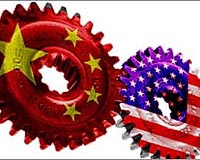| . |  |
. |
Quito (AFP) Sept 14, 2009 A US deal to use Colombian bases is to be scrutinized at a regional meeting on Tuesday of South America's defense and foreign ministers in Ecuador amid fears the region risks armed instability. The talks extend concerns over the US-Colombia plan already expressed at a Union of South American Nations (Unasur) summit last month, while including other defense pacts at Bogota's insistence. Venezuela's purchases of more than four billion dollars' worth of Russian military hardware, and Brazil's recent 12-billion-dollar purchase of French submarines and helicopters and likely acquisition of French fighter jets were also open to discussion, officials said. "All accords, not only that of the United States and Colombia, enter in the process of establishing mutual trust," said Ecuadorian Defense Minister Javier Ponce, whose country currently chairs Unasur. Several nations, notably Venezuela, Ecuador, Bolivia, Brazil and Argentina, have objected to the US plan to use seven Colombian bases, saying the US military deployment would be suspiciously large for the stated purpose of fighting Colombian drug traffickers and rebels. But Ponce said Tuesday's meeting "is not about blocking this accord, but rather about getting information" to allay fears the US presence could threaten neighboring countries. Venezuela's ambassador to Colombia, Gustavo Marquez, said: "Everybody has to put everything on the table. Someone has a deal with Russia? OK, put it on the table. Someone has one with the US? Put it on the table." Brazil's President Luiz Inacio Lula da Silva and Venezuelan President Hugo Chavez have called on US President Barack Obama to attend a Unasur summit to explain the reasons for using the bases in Colombia. So far Obama has given no indication of accepting the request but he, Lula and Argentine President Cristina Kirchner will all be at a G20 summit in Pittsburgh, Pennsylvania, at the end of next week. Several South American states have suggested they should handle anti-narcotics operations themselves, without any involvement from the United States, the biggest market for the region's cocaine. Ecuador said it would present a text outlining South America's self-sufficiency in security matters and recommending information-sharing to alleviate distrust. Bolivia's President Evo Morales, meanwhile, used a trip on Monday to Spain to again lash out at the plan for bases in Colombia, saying: "In Latin America, where there is a US military base there are military coups." He added however that "Bolivia is not going to break off relations with anyone, not the United States" over the issue.
Share This Article With Planet Earth
Related Links Learn about the Superpowers of the 21st Century at SpaceWar.com Learn about nuclear weapons doctrine and defense at SpaceWar.com
 China cool on idea of 'G2' with US, says Beijing envoy
China cool on idea of 'G2' with US, says Beijing envoyTokyo (AFP) Sept 10, 2009 China's ambassador to Japan said Thursday his country does not favour the idea of a 'Group of Two' or G2 that would place the United States and China at the helm of international affairs. Beijing instead supports the "democratisation of international relations" over the "dominance of the world by a few countries," China's ambassador to Japan, Cui Tiankai, said in a Tokyo address on Thursday. ... read more |
|
| The content herein, unless otherwise known to be public domain, are Copyright 1995-2009 - SpaceDaily. AFP and UPI Wire Stories are copyright Agence France-Presse and United Press International. ESA Portal Reports are copyright European Space Agency. All NASA sourced material is public domain. Additional copyrights may apply in whole or part to other bona fide parties. Advertising does not imply endorsement,agreement or approval of any opinions, statements or information provided by SpaceDaily on any Web page published or hosted by SpaceDaily. Privacy Statement |